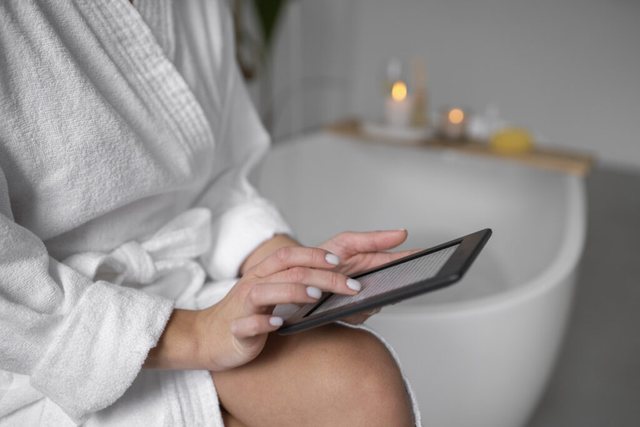
Why should you not take your mobile phone with you to the toilet?

The habit of using a cell phone in the toilet can be dangerous to health, as prolonged standing can affect blood circulation and pelvic muscles.
Our mobile phones have almost become an extension of our hand, so much so that we hardly ever leave them behind in the toilet. Many use them to browse social media or reply to messages, turning a few minutes on the toilet into 15 or more. But, according to experts, this habit can have significant effects on our health.
What are the dangers of standing on the toilet for a long time?
An open toilet seat can put pressure on the lower body, as gravity pulls blood down, making it harder for blood to return to the heart. Dr. Lai Xue, a surgeon at the University of Texas Southwestern Medical Center, explains that increased pressure causes the veins around the anus to swell, which increases the risk of hemorrhoids.
In addition, prolonged sitting on the toilet has negative consequences for the pelvic muscles. According to research, these muscles are responsible for the normal functioning of the intestines, as they work with the rest of the body to ensure the smooth elimination of feces. When these muscles are overworked with prolonged pressure, they can weaken, which affects their ability to control bowel movements.
How long is "healthy"?
Experts emphasize that the time we spend in the toilet should be limited to 5-10 minutes. According to the American Medical Association, standing longer than that poses potential risks of cutting off blood circulation and putting too much pressure on the pelvic muscles.
Dr Xue warns that prolonged use of the toilet, especially in combination with the pressure exerted by sitting, can increase the risk of developing hemorrhoids or other related conditions.
How to reduce the time spent on the toilet
To limit the time we spend on the toilet, experts suggest avoiding the use of mobile phones, magazines and books. If we cannot relieve ourselves, it is better to stop after 10 minutes, get up and walk a little, as movement can stimulate the muscles of the intestines.
In addition, it's important to stay hydrated and eat fiber-rich foods like oats and beans to facilitate regular bowel movements and avoid straining. Drinking 2.7 to 3.7 liters of water a day and 14 grams of fiber for every 1,000 calories of food helps soften stools, making them easier to pass.
Colon cancer risk
Prolonged difficulty or discomfort with bowel movements can be a symptom of gastrointestinal problems, such as irritable bowel syndrome or Crohn's disease. In addition, worsening constipation or having to sit on the toilet for a long time can be a sign of colon cancer. When a tumor inside the colon grows, it can block the flow of stool, causing constipation and bleeding.
According to the American Cancer Society, rates of colon cancer have increased in people under the age of 55 since the 1990s. In 2024, 106,590 new cases of colon cancer and 46,220 new cases of colorectal cancer are expected. thick.
Therefore, if you notice constipation or if staying on the toilet lasts more than three weeks, it is advisable to consult a doctor.
Latest news


Trump says he's ready to raise tariffs to 70% on some countries
2025-07-04 22:35:52
Tre shenjat e zodiakut që do ‘pasurohen’ në Korrik
2025-07-04 22:05:09
Gaza War: Hamas Accepts US Proposal for 60-Day Ceasefire
2025-07-04 21:50:10
Autocracy in Albania, Fuga: Governance has gotten out of control
2025-07-04 21:40:51
Meta: Agriculture on credit, the new fraud!
2025-07-04 21:26:39




Vote recount in Durrës ends without changes
2025-07-04 20:12:54
Gas station explodes in Rome, 25 injured (VIDEO)
2025-07-04 20:00:20

These afternoon habits often sabotage weight loss
2025-07-04 19:39:28
Former Arsenal player Thomas Partey accused of rape
2025-07-04 19:24:21
Shepherd disappears without a trace in Delvina
2025-07-04 19:14:31

Bardho gave Zegjine's mandate/Braho: Unfair! It violates the electoral system
2025-07-04 19:01:08


Rapid developments in the Sultanates!
2025-07-04 18:00:06



Italy tightens rules for skateboard traffic
2025-07-04 17:20:18

Unusual for the time, dense fog covers the coast of Vlora
2025-07-04 16:48:01


Accident on the Shkodra-Lezhë axis, one dead and 3 injured
2025-07-04 16:14:19
Albania with fewer requests for asylum and Albanian citizenship in 2024
2025-07-04 16:06:57

Albania last for quality of life, DP: Technical government is the solution!
2025-07-04 15:42:30
Nico Williams says "No" to Barcelona, signs with Athletic Club until 2035
2025-07-04 15:33:35
Fires in the country, four fires are still active, what is the situation?
2025-07-04 15:24:20

Summer brings big changes for these 4 zodiac signs
2025-07-04 15:00:04
Osmani: MPs need to agree to a secret ballot for the Speaker of Parliament
2025-07-04 14:51:09
Serious accident on the Peqin-Elbasan axis, two injured
2025-07-04 14:37:56

GJKKO leaves in force the security measure for the head of the KPP
2025-07-04 13:58:17
Who will replace Ilir Meta and take over the leadership of the PL?
2025-07-04 13:50:36
Berisha: Dismissal of directors in Vlora, another act of 'scapegoats'
2025-07-04 13:41:46




Librazhd/ In a serious psychological state, the young man consumes pesticides
2025-07-04 13:05:07


Weapons trafficked from Kosovo to Albania, two arrested, 8 pistols seized
2025-07-04 12:33:28
Konsumimi i tepërt i çokollatës, ja cilat janë dëmet që shkakton në organizëm
2025-07-04 12:23:35

Fires in the country, 21 fires in the last 24 hours, 4 still active
2025-07-04 12:00:19
WB calls for debt transparency: Albania to publish details of every loan
2025-07-04 11:50:05
Changes in the State Police, new names expected to lead 5 police stations
2025-07-04 11:40:06

The race for the head of the BKH, the third phase on July 11
2025-07-04 11:20:23

Toxic phrases that show your relationship is in trouble
2025-07-04 11:00:10

2 brothers arrested in Roskovec, cultivating narcotic plants
2025-07-04 10:38:08

Celebrating his 61st birthday today, Rama is surprised at the pink headquarters
2025-07-04 10:21:46
Suspended from duty 4 days ago, Jonaid Myzyri appears before the Criminal Court
2025-07-04 10:16:27
Heat wave/ 5 deaths in Italy from high temperatures
2025-07-04 10:07:55
Economy slows, telecommunications joins agriculture and industry in recession
2025-07-04 09:58:13



Fire continues at Elbasan incinerator, toxic smoke endangers citizens' health
2025-07-04 09:19:06
The USA celebrates its 249th anniversary of Independence
2025-07-04 09:09:22

After Rama's ultimatum, all directors of the Vlora municipality resign
2025-07-04 08:46:30
Russia, the first country in the world to recognize the Taliban government
2025-07-04 08:37:20
10 facts about the 10th legislature!
2025-07-04 08:21:35
Foreign exchange/ How much foreign currencies are bought and sold today
2025-07-04 08:01:50

Weather forecast for today
2025-07-04 07:36:43
"Don't be afraid", here's what the stars have predicted for each sign
2025-07-04 07:21:48
Morning Post/ In 2 lines: What mattered yesterday in Albania
2025-07-04 07:03:17
Bushati: Zegjineja, a book piloted by Rama
2025-07-03 22:57:30








Greece imposes fee to visit Santorini, how many euros tourists must pay
2025-07-03 20:50:37
Don't make fun of the highlanders, Elisa!
2025-07-03 20:43:43
Gunfire in Durres, a 30-year-old man is injured
2025-07-03 20:30:52

The recount in Fier cast doubt on the integrity of the vote
2025-07-03 20:09:03




